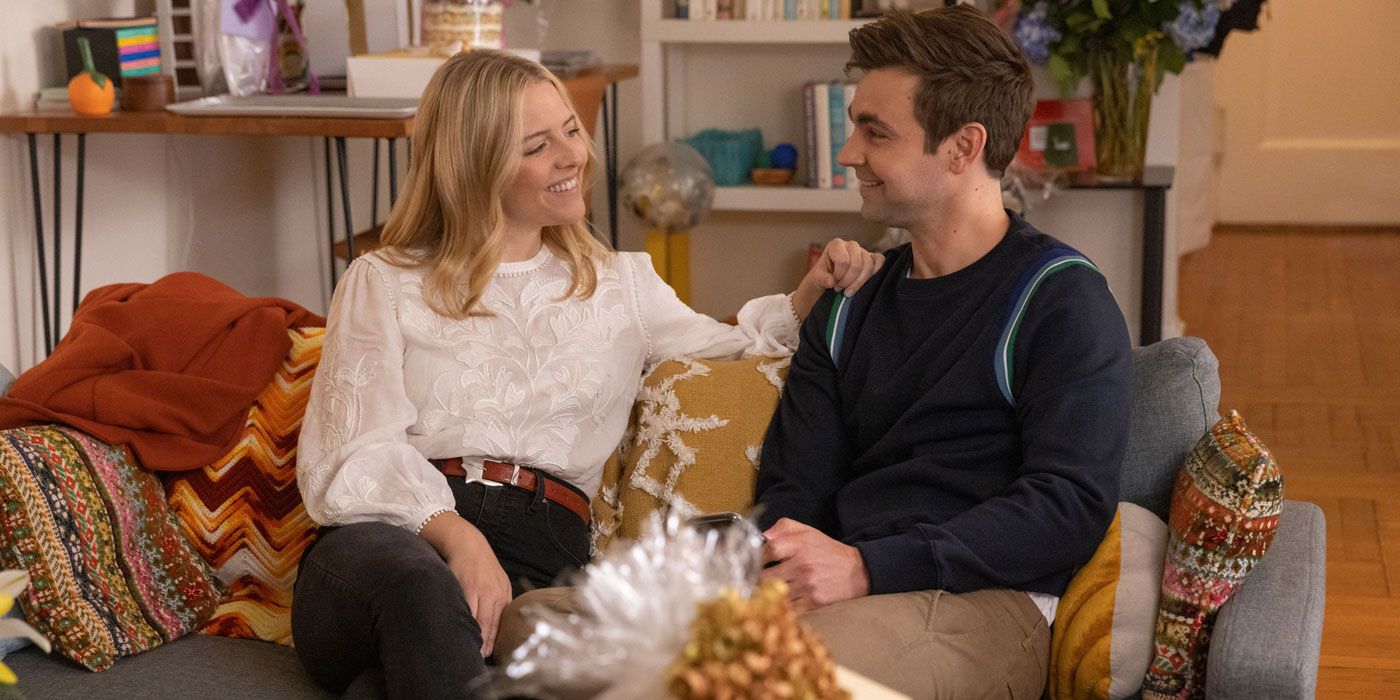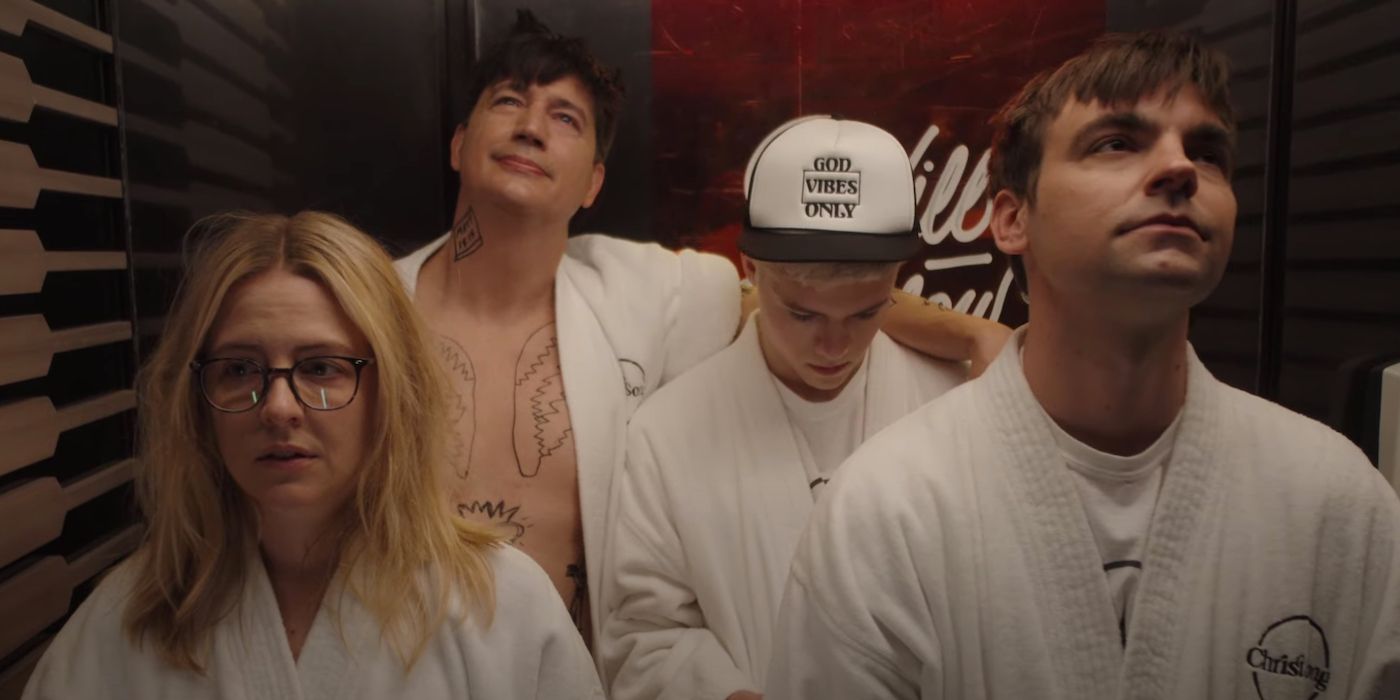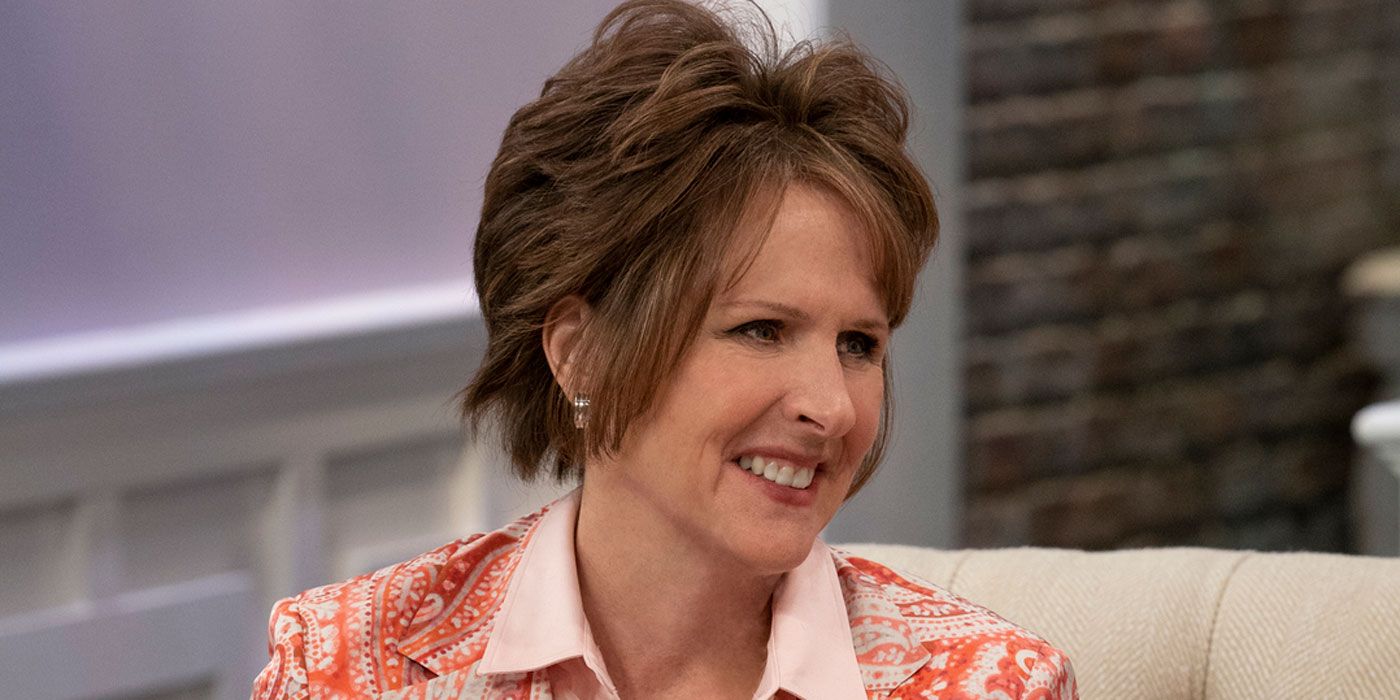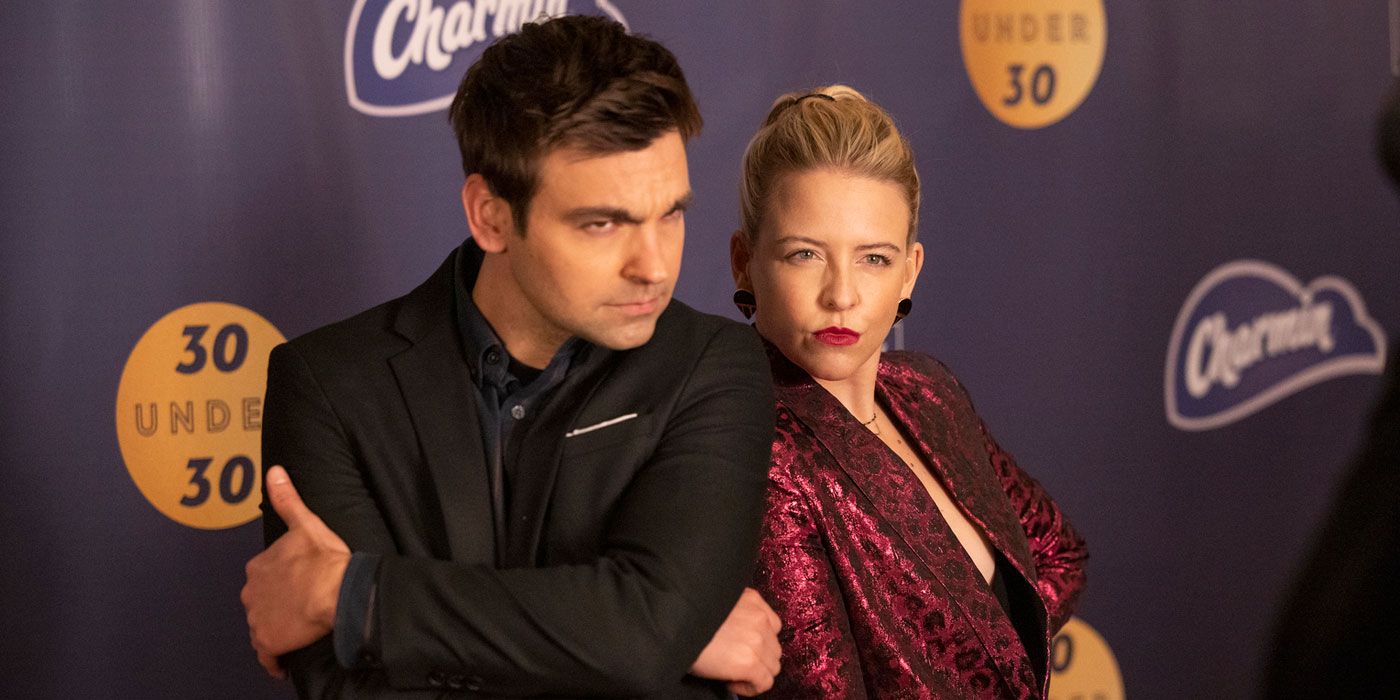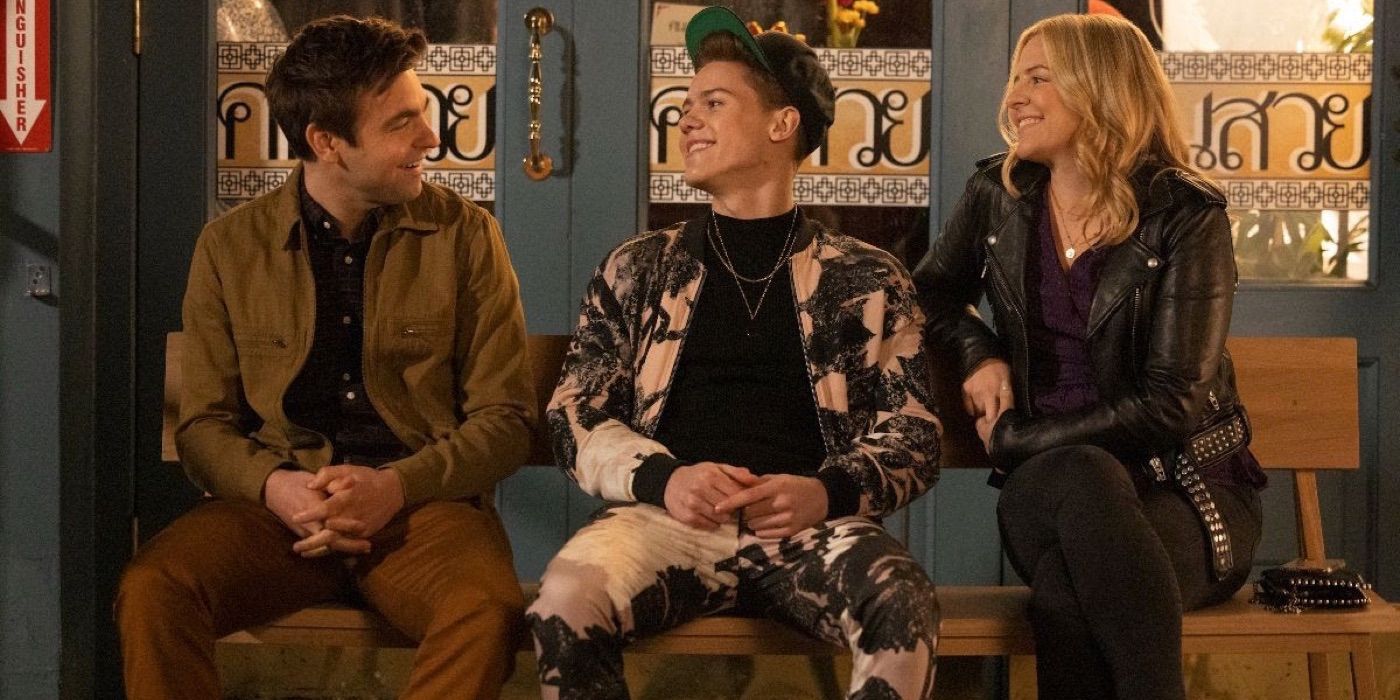Talking to The Other Two creators Chris Kelly and Sarah Schneider is an experience on par with watching their show: Always funny and engaging and clever, but with some true insight included in the mix. The comedy about the two older siblings of a newly minted teen pop star moved from Comedy Central to HBO Max for its second season, but not much has changed about the Hollywood satire, including the richly detailed jokes packed into each episode and the depth of feeling each character inspires.
In a Zoom interview with Collider, Kelly and Schneider went into detail about how both the pandemic and the change in networks affected the show, the "Walt from Lost" situation they faced with Season 2, and why no reference is potentially too obscure for them. They also explained why the show could conceivably go on for a long time, as long as they keep switching things up.
Collider: To start things off, walk me through the journey from Season 1 being on Comedy Central to Season 2 launching on HBO Max.
CHRIS KELLY: I mean, we don't honestly even really know to be honest. We were shooting Season 2 last year and we got shut down for the pandemic. And so while we were just shut down doing nothing, with our lives, we got a call basically finding out that the show was moving to HBO Max, which was thrilling. And it was nice, because when we went back to go finish shooting Season 2, it just allowed us a little more flexibility. We had written the season, it was still the same season, but we have a looser running time basically, is the main difference. And so this season is sort of jam-packed and now we're telling more stories and longer stories and hopefully some deeper stories.
And so it gives us the ability to have some breathing room in each episode and not feel like it's just zany, zany, zany, zany, zany and then it ends. Because we really want the show to still feel grounded and have humanity to it and the characters talk to each other and care about each other. So just being on HBO Max allows us to not feel like we're rushing, basically, to meet our running time. And hopefully have more people see the show too.
Of course. Yeah. The "see the show" part is a big factor here — did you notice a bump in interest, after Season 1 launched on HBO Max?
KELLY: Yeah, we can't leave our homes.
Yes. That's why you can't leave your house.
KELLY: Right outside of my front yard. The pandemic is a small part of it.
SARAH SCHNEIDER: Yeah, Chris does not care about that at all... In and out of restaurants, he is.
KELLY: For real it was nice. We did notice people being like, oh what's this, when Season 1 came out on HBO, which is nice. And hopefully with Season 2 coming out, even more people will find it. I don't know, we just hope... We think the cast is so good and we've worked on it for so long. So hopefully more people will discover it.
Of course. Just a quick question for clarification — you got shut down because of the pandemic. How far into the season were you?
SCHNEIDER: We were four episodes and then like, change. We had shot, weirdly, a couple of scenes and Episode 6 and Episode 8. We had shot some pieces, we were like 40 percent through.
And some of the things that we had shot, we then had to come back and shoot the continuous scene that follows a full year later. So in one of the episodes they leave a restaurant and they go outside, and those two scenes are a year apart even though they are running continuously. So, it was a wild ride.
KELLY: It was a wild ride, yeah.
Yeah, no, absolutely. But I imagine that with Case Walker, the actor playing Chase, you had some Walt from Lost issues.
KELLY: Yeah. He's really given Walt from Lost a run for his money. It was a problem I guess. And then we were like there's literally, physically nothing anyone can do about it. It's just a child is aging. And then once the pandemic hit it was the least of our problems. So we were like, who cares? Sometimes in scenes he looks 16, sometimes he looks 45. But yeah, it was fine. When we started back up shooting after the pandemic, he had turned 18, the actor. And so it was just like in scenes, we were like "okay Case you crouch, Drew you get on your tip toes." But whatever, it is what it is.
I think there's something there's something authentic to it. Because kids at that age, especially within the industry, do have that weird jump.
KELLY: Yeah. And it actually doesn't... It doesn't not work for the season, especially as the season progresses, like in the back half. He is getting older and he is starting to mature. So it doesn't not work. It's just... Yeah, he was 16 when we started Season 2 and now he's 18.
Season 2 features Pat exploring her new career path, and there's something about the fact that she's actually really good at it that's quite striking. Was that your intention?
SCHNEIDER: Yeah. Same as with the first season where, even though we're kind of making fun of Chase, we still want people to watch and feel the way that our characters feel, which is that they don't not get it. There is something there, we understand why this kid has gotten so much success overnight.
So we wanted to do the same in this season. You want to, you need to believe that Pat is a success. She is the number one show on daytime. She does have this rabid fan base of women who look up to her and see her as their equal, basically, in order for a lot of our plots and a lot of this season to build on. So that was important to us. And we shot in the actual Rachael Ray studio, because we wanted it to all feel very real, very legit, very authentic. So that they're now feeling less than to their mother rang true. And it wasn't like, why do you care? She's like in a closet and no one watches her.
KELLY: And I think part of the reason that Pat is good at hosting a talk show is because she just is who she is and she's authentic. You just buy that what you're seeing is what you're getting with her. And she is the real deal. People feel like they know her and they are her and they relate to her and they see themselves in her.
And I think, we talked about that in Season 1 with Cary, a large part of why things weren't working for him is that he didn't feel comfortable in his own skin and he didn't feel like he fully just liked himself or knew who he was. And I think Pat is just like, this is who I am. I am a mum from Ohio, I randomly got a talk show, let's have fun. And the audience can sense that about her and it's kind of why it's working for her
Well something that's interesting about it too, is that in Season 1, the one big secret she had was about what happened to Chase's father, which goes away and gets revealed in a very public way. Do you feel like, without having that secret reveal, that you could have moved on to this new phase of her story?
KELLY: I think that's what started it all for her. She was very vulnerable and honest and she had a full breakdown on a plane on camera in front of a bunch of people. And she was so worried it was going to hurt her and hurt Chase and hurt her family. But instead it was very nice to see a woman just be honest and vulnerable and real about what she was going through. And again, it's like people can see themselves in her. And even if they hadn't had their husband stick freeze to a roof they could relate to her in other ways. But yeah, I do think that's also part of why she's so successful. And we touched on that in episode two a little bit, where other women who have gone through things that she's gone through, they've struggled with relationships or... Yeah, they're like I'm Pat and she's me. And so that's basically the whole reason she has this talk show.
When you're making a show like this and you have characters who could fall into the unlikable category — what's been the conversation about where and how far to push somebody?
SCHNEIDER: I think we've talked a lot about... We are willing to and we like to send our characters into unlikable [places]. As long as the reason they're doing it is a grounded, relatable need from within them. A good example is Brooke spends all of Episode 3 running and screaming and yelling at this woman to get on this fucking conference call. But it's because she just thought this was going to be something else. She thought, she finally has her dream and had a picture of how it was going to be, and it doesn't look that way. So she's not doing it willy nilly and just being rude and unlikeable for no reason. It's because she's struggling with that. She's struggling with the idea of, she finally got her dream and it doesn't look anything like how she thought it was going to look. So I think that lets us push our characters into these ridiculous stories, because where they're coming from always feels relatable and it feels human and it feels... Yeah, and grounded, like I was saying,
KELLY: Yeah. If anyone's acting poorly or rudely or selfishly it's only because they're insecure and only because they're embarrassed or only because they want something. So yeah, we talk about that a lot in the writer's room too, just making sure that like this is a family show. Or not a family show, but a show about a family. And so the relationships are the things that are the most important to us. Yeah, like just what Sarah was saying. In Episode 4, Brooke books a bunch of hotties on her mom's show so that when they're there she can ask them out on dates. And it's like a dumb, madcap thing, you know Brooke. But it is basically because she's lonely and her brother is in a relationship and her mom's in a relationship. And she now has her dream job, but it's lonely. Yeah, we're just trying to make sure any rude or dumb or mean thing any character does, you understand why they're doing it. So it just doesn't feel like cartoon villainy.
In terms of the reference points you guys are using — in your heads, is there a reference that's too obscure to make or too off the radar?
KELLY: No, not for us in particular. Sometimes people maybe will send us back a note being like, do we think people will know who this is? I think in general we feel like if the shows are jam-packed enough, if you miss one you'll get the next one. We also like some of these specific references. A, just because they're funny to us. But also B, because when Brooke and Cary are talking to each other we liked that they would throw around very specific references. They watch the same shows, they know the same things, they're online the same way. So when characters can have a shorthand with each other where they're referencing things very specifically, you just hopefully get a laugh out of it, but also buy the relationship even more because you can just hear the shorthand.
Even in Episode 5, when Brooke is going through her phone and all of her dick pics are just of Noah Centineo. Cary knows that about her. We just liked that it's like, you might not know exactly the dick pic we're referring to. But yeah, there's just an ease with which they talk to each other. So that's almost more important to us than the actual joke or reference itself, if that makes sense.
SCHNEIDER: Yeah, I think like a line-by-line basis. It's like if it makes Chris and I laugh, then we feel pretty comfortable putting it in there. And then on a larger level, if it's going to be the whole premise of an episode or something, we want it to feel... Like that feels like we want to make sure it feels fair and it feels like something that people would know, because otherwise you're completely off board from minute one of an entire episode.
KELLY: Yeah, it's like... People might not know every single detail about these celebrity churches, but I think you know enough that like you know that they're a thing. You know that it's this dumb thing that celebrities do. It's like not-church church. Yeah.
Gotcha. Along those lines, do you have a particular favorite obscure reference that you feel like... If it's in there, it's just because you guys like it?
KELLY: I don't know... I think one of the things that's so nice, especially about our crew, is we're able to have so many little extra jokes and details. Our costume department is always putting extra jokes and things, and our production design team is always putting jokes and things. So even just in Episode 3 at the party that is the unveiling of the newest Hadid sister, she's just in the background all the time. If you're looking, she's like under a sheet and you can kind of tell she's on her phone. It's a party that doesn't really need another comedy premise to it. They could just be at a party. But I think we like to add a detail that they're unveiling the newest Hadid sister's face and body to industry insiders. It makes me laugh, because it's just a stupid little thing. If you want it, you can have it and if you don't know what that is, you can just keep it moving. But it does make me laugh that there's just a whole woman standing under a sheet at a party for like six hours.
So looking forward, how many seasons do you feel like this show could continue for?
SCHNEIDER: That's a good question too. I think we've talked about where we might want to take these characters, but I think for us as showrunners and creators... What we did at the end of the first season was completely shift the dynamic of the show. And so that would be something that we would want to continue to do. So each season would become a different thing, become a different beast, give us new foils for our characters. Give our characters a new status or position in life that we could tell new stories from.
KELLY: Yeah, we feel like there's an infinite amount of stories.
SCHNEIDER: Infinite.
KELLY: Not necessarily like, okay then in Season 3 this person would be famous now. It doesn't need to be as obvious as that. But it is the one nice thing we found even in writing in Season 2, is that the title, The Other Two, just evokes a lot of just... There's no like okay, at the end of Season 3 they all are famous and happy and successful. You know what I mean? No matter where you are in your life, no matter what your station is in life, you're always going to compare yourself to other people. You're always going to feel insecure. You're going to find new, fun new ways to be unhappy and unsatisfied no matter what you're doing. So I think there's a thousand different ways to come at the premise without repeating ourselves, if that makes sense.
Yeah, absolutely. Does this mean that Season 2 builds up to whatever Season 3 might be?
KELLY: I think it builds up to more potential episodes, but it doesn't leave like, okay, Season 3 is going to be this.
SCHNEIDER: Yeah, we learned from our first season finale where we were like here's exactly what's going to happen... And then we had to figure out how to make that happen. So this season we were like let's put it in a direction, but we could go a couple of ways if we got to.
KELLY: Also the back half of Season 2 is sort of bonkers and we make big moves in it. So it's like, yeah, I don't know. I think we'd be excited to see where Season 3 takes us, but it's not as simple as like "Now Streeter is a movie star!" Or, well, maybe.
SCHNEIDER: Chris!
So in general, you talked about the Season 1 ending, which reveals the fact that Chase can't really sing — it's a wonderful way to cap off the season. In terms of that moment in the context of the show in general, what are you aiming to say about Hollywood as a culture, as an industry?
SCHNEIDER: Oh my.
KELLY: Oh boy, that's quite a question.
Feel free to answer it in a way that definitely won't sabotage your careers.
SCHNEIDER: I know. We love it and we'd love to work with anyone reading this.
KELLY: Oh, this deserves a good answer and guess what? I don't have it. But I think, well, with Chase, in particular, we thought it was fun that he couldn't sing. That was like the emperor has no clothes. And it was sort of beside the point that no one had bothered to think about the fact that he couldn't sing. And no one had actually heard him sing live. Everyone was like, oh yeah.
But in Season 2, it really did open up things for us. We wanted to do two things with Chase in Season 2. One was that he wanted to go to college and be a regular kid. And we wanted to delve into like, that's easier said than done. A very famous person can't just be like, you know what actually, never mind, I'm just going to be regular. That it's like you can't put the toothpaste back in the tube. He's well-known and you just can't turn the light switch off. But then also, because he can't sing, everyone's sort of like, well if he wants to stay famous, what the fuck do we do with this kid?
And we liked that Wanda Sykes' character is like this is literally not a problem at all. Singing is a very small percentage of what a singer does. When is the last time you heard a singer sing? No, singers are in movies, singers have colognes, singers guested at Vogue. Singers own basketball teams. He could be like Rihanna or Justin Timberlake. She doesn't even miss a beat. And so that allowed us to be like, okay so if he's not singing, what are other dumb, weird, fun things he would do? Basically building his singing empire in every other way but singing, which we think is a funny true thing. Singers... Yeah, one percent of their job, one percent of their money comes from actual singing, which is very interesting to us.
SCHNEIDER: I also think it's about the industry because they have jobs in the industry, but it's about any sort of career. Sort of what we were saying earlier of, this season we're interested in exploring for both Pat and Chase and our two leads, what it looks like to actually achieve success. What it looks like to actually achieve your dream. And once you're there, was it what you expected? What is worse about it? What's better? There is no such thing as reaching the end, like we've been saying. So what that means within our show, our show is in the entertainment industry, so it's commenting on that. But I think in a larger sense, it's just that sort of... What is it to be happy? And if that looks... You think it looks like a certain way, and then you reach that and it doesn't feel as good as you thought. What do you do next?
KELLY: How do you look at as like yeah, all this celebrity, showbiz stuff, these are all fun trappings on top of just a regular story. But you can tell the same stories without it if you wanted to. Of like being insecure, comparing yourself to your friends or your family, or feeling lonely, or getting your dream job and it underwhelming you. We like that it works in the celebrity world because it's fun and we like writing pop culture jokes but-
SCHNEIDER: And because that's like... Yeah. That's like the pinnacle of success, is to have a number one show in daytime and have a million fans and be adored. Is that the dream?
KELLY: Yeah.
The Other Two is streaming now on HBO Max. New episodes premiere Thursdays.

